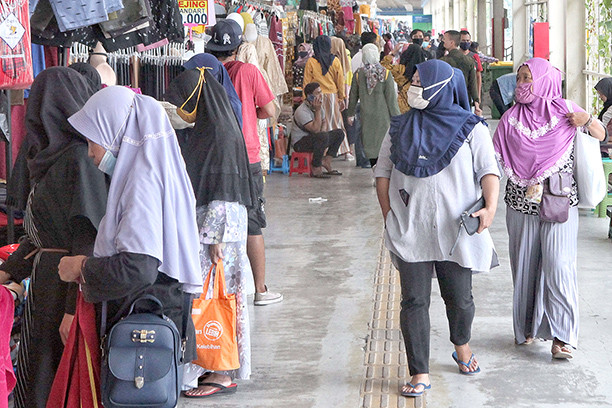Popular Reads
Top Results
Can't find what you're looking for?
View all search resultsPopular Reads
Top Results
Can't find what you're looking for?
View all search resultsProlonged pandemic could derail RI economy
"This is a health crisis. Unless you can address this effectively, you can’t have a full recovery,” ADB’s director for macroeconomics research Abdul Abiad said.
Change text size
Gift Premium Articles
to Anyone
A
prolonged pandemic could potentially harm Indonesia’s economic recovery as the continued rise in COVID-19 cases in the country adds uncertainty, resulting in a weak economic indicator outlook, economists have said.
In a recently published report, titled Asian Development Outlook 2020 Update, the Asian Development Bank (ADB) stated that continued disruption from the coronavirus “will have severe implications for growth” for Indonesia, with domestic demand and export prospects dampened as a consequence.
“The main risk for the outlook of Indonesia, and also the [Asian] region, stems from the possibility of a prolonged COVID-19 pandemic, which could potentially derail the recovery process,” ADB’s country economist for Indonesia Emma Allen said during a webinar held by the development bank on Tuesday.
As of Tuesday, Indonesia had recorded a total of 223,030 confirmed COVID-19 cases across the country. Cases reached beyond 100,000 on July 27, before surpassing 200,000 on Sept. 8.
In Indonesia's capital city, Jakarta, 1,076 new cases were recorded on Tuesday alone. Jakarta Governor Anies Baswedan announced on Sept. 9 a reimposition of large-scale social restrictions (PSBB) replacing the “transitional PSBB” it had put in place, over fear that the city would run out of isolation beds by Sept. 17 if no additional restriction measures were put in place.
“Basically, there isn’t a trade-off. This is a health crisis. Unless you can address this effectively, you can’t have a full recovery,” ADB’s director for macroeconomics research Abdul Abiad stated during the webinar, responding to a question on whether the country should prioritize its health or its economy.
He went on to explain that some policies were more effective than others in reducing the incidence rate. For example, gathering bans are said to be more effective than workplace or public transit closures, according to the ADB report.
“We have to remember that containment has many different dimensions and if you focus on the things that help with the outbreak and don’t hurt the economy so much, you will do well,” Abdul concluded.
The ADB projects that Indonesia’s economy will shrink 1 percent in 2020. The figure is a downward revision from ADB’s April projection that the country would grow 2.5 percent this year. Last year, Indonesia’s gross domestic product (GDP) grew 5 percent.
For 2021, the regional development bank estimates that the country’s GDP will grow 5.3 percent, up from its April projection of 5 percent.
Hidayat Amir, the director for macroeconomic policy at the Finance Ministry’s Fiscal Policy Agency, said the outlook ADB presented was in line with the agency’s recent projection.
The government has estimated that the country’s economy will contract 1.1 percent at worst or grow just 0.2 percent at best in 2020. Next year, the government projects growth of between 4.5 and 5.5 percent.
“We are still working within a range because we are facing high uncertainty,” Hidayat noted during the webinar.
Other economists projected a gloomier outlook for Indonesia’s economy.
Bank CIMB Niaga chief economist Adrian Panggabean said during the webinar that he was still reworking a 2020 forecast as recent indicators showed a worsening trend.
“It looks to me that the forecast for the third quarter will be worse than I had anticipated earlier, [hence] the full year growth will be worse than minus 1 percent,” Adrian said.
Centre for Strategic and International Studies (CSIS) economic department head Yose Rizal Damuri, meanwhile, noted that Indonesia had not succeeded in lowering its COVID-19 intensity index.
According to its COVID-19 intensity index, which measures the COVID-19 mortality index, growth index and active cases index on a national level, Indonesia continues to book an upward trend. As of Sept. 13, the country scored 1,546. At the beginning of the month, that number was 1,450.
“I think all of this has to be taken into consideration for the forecast. In my opinion, minus 1 percent is too optimistic,” Yose said.
In the World Bank’s report, titled The Long Road to Recovery, the international financial institution states that Indonesia’s GDP is expected to be unchanged from 2019.
However, a deeper contraction of 2 percent was likely to take place if the global economy slipped into a deeper recession and further mobility restrictions were reinstated in Indonesia, World Bank Indonesia lead economist Frederico Gil Sander said on July 16.










